Siberian Huskies are beautiful dogs. They look like wolves, and have thick, soft coats, that make them infinitely cuddly. They have piercing eyes, and wonderful masks, that give them a roguish and unique look.
Siberians can make very good family pets. If properly trained, they can be very good with people, children, and other dogs. Indeed, Sibes are commonly known for their friendliness toward people.

Although they may look like fierce wolves, they have the heart of Casanova. All my Huskies want to do, is greet everyone and give them licks.
However, many people have trouble with this breed, and many Sibes get surrendered every year.
Consider these Siberian Husky facts, before going out and getting a puppy. The Siberian Husky is a very special and lovable breed, but they may not be the right breed for everyone.
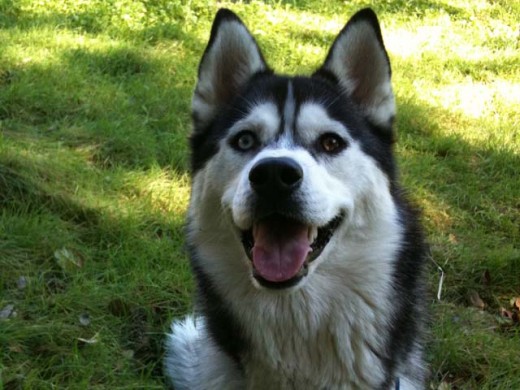
1. Siberian Huskies Shed a Lot!
Be ready to have dog hair all over the house – floors, carpets, clothing, furniture, everywhere.
If we are allergic to dog hair, or like our home to be very clean, then the Siberian Husky is not for us.
When I was looking for a Sibe, I talked to a few breeders in my area. The first thing they all said was, “Siberians shed a lot”. I mentioned that my other dog, a Shiba Inu, also has a double coat, and also sheds a fair amount. However, they all said, “Siberians shed a lot more”.


And they do! A whole lot more.
Therefore, it is very important to train our Husky puppy to enjoy the grooming experience.
- I start with a soft brush, and lightly comb my dog’s body for a short period of time.
- I do this often, and pair it with food rewards.
- Once my puppy is comfortable with the brushing process, I very slowly extend the length of our grooming session.
- Finally, I repeat the process with a more solid brush, such as the Furminator.
Frequent brushing is a good idea to keep our Husky clean, and clear out loose hair. The more hair on the Furminator, the less hair on the floor.
About twice a year, my Sibes blow their coat. During this time, there will be more fur than ever. To keep things under control, I try to brush every day. Remember to always keep brushing sessions fun, rewarding, and not overly long.
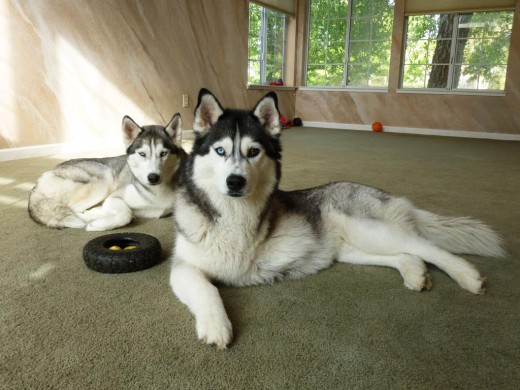
2. Siberian Huskies Make Awful Watch Dogs
Because Huskies look like wolves, many people assume that they are fierce dogs. Some people may even think that they are wolf hybrids.
However, a Sibe is more of a lover and less of a fighter.
When confronted with a stranger, my Husky will usually run up to him, give licks, and beg for food. As a result, Sibes do not make very good watch dogs. They will not only welcome everyone into your house, but will also give them the royal lick treatment.
If we want a dog that is only loyal to us and our family, then the Siberian Husky is not for us.
My Huskies are naturally happy and trusting dogs, who like to be with everyone. That is one of the things that I love most about them.
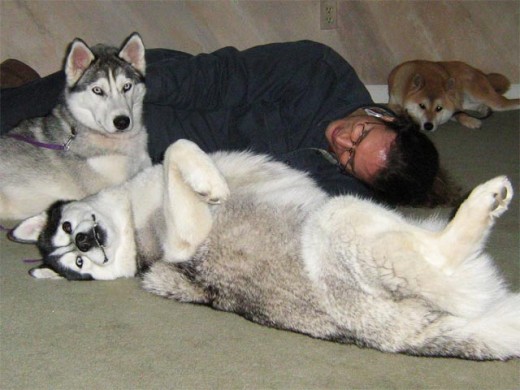
The Siberian Husky is not a watch dog, although those ignorant of his true nature may be frightened by his appearance. If you want a dog with aggressive guard-dog instincts . . . don’t buy a Siberian.
~~[SHCA]Leave your home in the care of a “guard” Siberian and he will most likely welcome an intruder with open arms, fetch (for the first time in his life) your valuables and show him the best route of escape–after all, Siberians are great escape artists.
~~[Siberian Rescue Site]
Note – This does not mean that Huskies will never be aggressive toward people. A dog’s behavior is determined both by genetics (breeding), as well as by training, socialization, context, and past experiences. A dog may become aggressive as a result of improper training, bad social experiences, insufficient socialization, and more.
For reasons of safety, it is important to ensure that our companion dogs are not people aggressive. Most companion dogs today guard us, by sounding an alert when unknown or strange people come close to our house. These dogs are not people aggressive. They do not bark, lunge, or growl at passers-by during walks. They are not aggressive toward guests and unknown visitors, who may need to work in or around our house. Their job is simply to alert us, when unusual events occur close to home. Anything more would quickly become dangerous and risky.
Highly trained guard dogs, such as those employed by law-enforcement, may be trained to attack or restrain an intruder. However, they are always under the control of their handler, are extremely well managed, and will only attack on-command or when they think their handler is in clear danger (as defined during training). They also do not bark or growl at pedestrians.
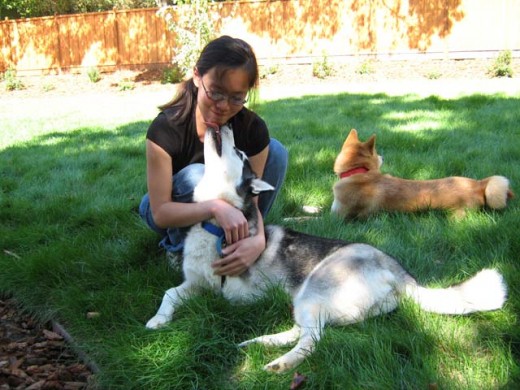
3. Siberian Huskies Have High Energy
They are intelligent, athletic, and were bred to pull sleds for extremely long distances, in the freezing cold. Therefore, be prepared to provide a Husky with a lot of mental and physical exercise.
A young Husky needs activity almost all day round. At around one-year old, my Sibe puppy sleeps for perhaps 3-4 hours during the day, and about 10 hours during the night. That leaves about 10 hours during the day where she is on the go.
She drains her energy most by playing with my other dog, a Shiba Inu. However, even my Shiba cannot fully keep up with her.


In addition to the playing, she works for all of her food, has long walks in the park several times a week, has structured dog play sessions, dog obedience training sessions, and still has energy left over to explore and dig in our backyard.
If bored, a Husky can become unhappy. He will likely escape, or use our house and belongings as chew toys. Unless our backyard is extremely secure, he can easily jump over or dig under a fence, in order to find adventure elsewhere.
If we are away at work for most of the day, then the Siberian Husky is probably not for us.
Siberians like having company and activity all day long. It is possible that a Husky can keep himself occupied if we have other dogs, but he may also lead our entire pack into mischief!
Sibes do best when there is frequent human supervision, throughout the day.
Siberians are a gregarious lot and need the company of other dogs or of people at all times.
~~[SHCA]The Husky needs lots of exercise and entertainment. They love to run and play, but must be allowed to do so safely.
~~[Hillside SPCA]

4. Siberian Huskies Are Independent Thinkers
They have a very independent mind and spirit, and will only perform, if we make it worth their while.
If we want an obedient dog that only lives to please us, then the Siberian Husky is not for us.
A Sibe is not a “yes sir, no sir“, kind of dog. To live well with him, we need to be fair, but firm. We need to consistently enforce our house rules, or he will take over the house.
The best way to train a Husky, is through the control of resources. Teach him that the best way to get what he wants, is to first do what we want. I use reward obedience training, and follow the Nothing in Life is Free program. Harsher techniques can make a Siberian distrustful, and ruin the natural free spirit of the breed.
Huskies are independent hunters. Their original breeders, the Chukchi of Northeastern Asia, would let their dogs free during the summer months to hunt for food on their own.
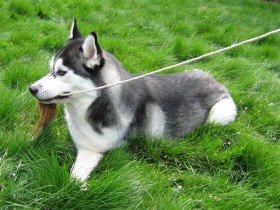
This has two very important consequences for living with a Husky today –
- A Siberian is not to be trusted with cats or other small animals. He can be trained to live with cats, but his instinct is to hunt them;
- A Siberian is not to be trusted off-leash. If he sees a small animal, he will likely bolt after it, and forget about cars, commands, and everything else. By the time he comes to his senses, he may be lost and far from home.
I have gotten a few comments about cats lately, so let me be clear …
Sibes can be trained to live with household cats. However, they usually have high prey drive, and will likely want to hunt and chase small animals, including squirrels, mice, and cats. Just because a Siberian gets along with our house cats, does not mean he will treat other neighborhood cats in the same way.
Huskies are bred to run and pull. This makes them more difficult to leash train than many other breeds. To train a Husky to walk on a leash, we need to have an immense amount of patience. Always be firm and consistent with the no-pulling rule, and reward good behavior.
If we do not have a large backyard, bring our Sibe to an enclosed park or soccer field, so that he can have some nice off-leash time to run, run, run.
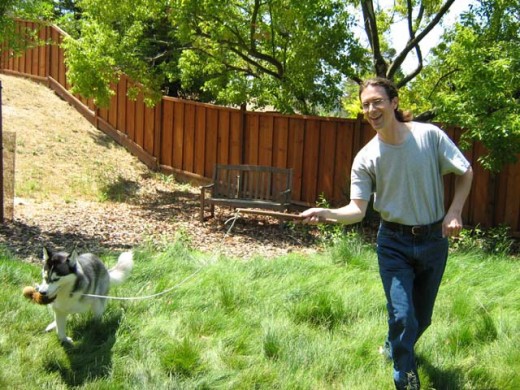
5. Siberian Huskies Are Not the Easiest Dogs to Potty Train
Certain dogs, like the Shiba Inu, are naturally clean and absolutely do not like soiling their living space. Because of their natural cleanliness, they are extremely easy to house train.
Sibes do not have that natural sense of cleanliness. In fact, they do not mind playing, and running around in their own waste products. Therefore, we must make it worth their while to potty outside.
Supervise our Husky puppy at all times, until he is fully house trained. Reward him well for pottying outside with high priority dog treats, play, and praise. If we are consistent with our puppy potty training, he will learn quickly, and be happy to go outside after a few weeks.
In addition, as Gigi points out, potty training difficulty is very dependent on what the dog or puppy is used to, in his previous environment. Puppy mill and pet store puppies are caged, most of the time. As a result, they will be harder to house train, because they are accustomed to going in their crates.

Where to Get a Siberian Husky Puppy
If we still want a Husky, then visit the Siberian Husky Club of America for a breeder list. Also consider adopting one from a local Husky rescue.
It really makes a BIG difference to get a puppy from an accredited breeder.
Please do not buy a puppy from online puppy sites or pet stores. Most of their puppies come from backyard breeders or puppy mills. Buying from them, will only help support and continue the dog cruelty of these unscrupulous puppy breeders.
If we are concerned about the initial cost of a puppy, consider that backyard breeders and puppy mills frequently produce unhealthy and unbalanced puppies. They will end up costing us a lot more, in terms of vet bills, dog training bills, and property destruction.
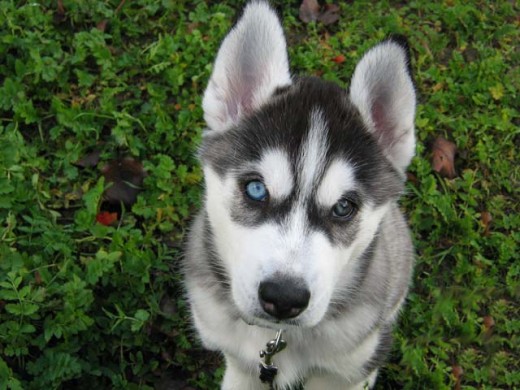
Siberian Huskies Are Wonderful Dogs

I love my Sibes. However, just because I think Huskies are wonderful dogs, does not mean that everyone else will think so as well; nor does it mean that they will fit into someone else’s lifestyle.
Clearly, each dog is an individual and will differ in terms of prey drive, energy level, obedience, and more. However, general breed characteristics and information from reputable sources, will give us a better idea of what to expect.
Often, there is conflicting information on the web. Therefore, one good place to start is with the AKC-recognized national breed club – The Siberian Husky Club of America.
Captivating in their beauty, grace and childlike demeanor, Siberians catch the eye of adults and children alike. They can be wonderful dogs for the well-informed or experienced Husky owner. However, they are NOT the breed for everyone and definitely not for first time dog owners. Too many wind up lost, in shelters, killed on the highway, abandoned or abused because the owner didn’t understand the breed and it’s challenging traits.
~~[Hillside SPCA]
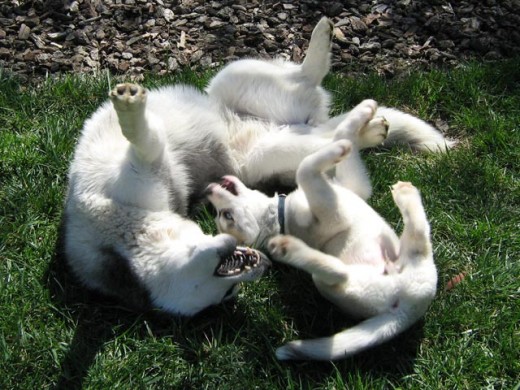
Hi I have 2 siberians both girls one is 4 (misty) and one is 3 (Cassie) we’ve had them both since they were 12 weeks old. Our problem is with misty the dominant female. She is so grumpy and seems to have many mood swings. If u go up to her for a stroke her first reaction is to growl and snarl. She sleeps all day apart from her walks which she seems to live for. She is also very food aggressive and has to eat alone. Cassie on the other hand is the complete opposite she is so harmless and sweet. She is the perfect dog but she loves misty so much. If I was to get rid of misty would I have to get rid of Cassie with her? If yes I won’t do it as its not cassies fault. I just don’t know what to do. I’m sick of us being growled at please help.
Thanks vj
Hello Veejay,
Dogs growl for a variety of reasons. Sometimes, it could be a physical issue which could be causing significant discomfort. Sometimes, it could be behavioral.
First, we can identify the cause of the growling. A vet will be able to diagnose a physical issue, and a good professional trainer will be able to identify what is triggering the behavioral issue. Once we know what is the source of the growling, then we can address either the physical discomfort or retrain the behavior.
Here is more on dog aggression-
http://www.humanesociety.org/animals/dogs/tips/aggression.html
Well, My grandfather has a husky mix and she is very aggressive toward our little dogs. (We live directly behind their house)She attacked my shih tzu mix and me and was ready to kill. We (my parents and my husband) have decided that this in NOT the place for her no matter how nice she is to people. We are worried that she will kill our cat or small dogs. However, my grandfather has not come to that conclusion. He is not a responsible pet owner as he allows her to be loose on the property and then she trots back to our house as she attempts to hunt. We are looking for a rescue organization for her as she is simply no longer welcome. My grandfather doesn’t want to get rid of her but he agreed to if we could find her a home.
Hi
I was just trying to do more research about huskies and found your website.. maybe you can help
I have a 10 year old golden retriever and when i brought into the house a husky two years ago (the husky is 2 years old) , the husky has never stopped biting or attacking my golden. sometimes the attacks are so rough and she bites on her ears and growls savagely while doing it. it happened every now and then and even if we try to separate them, we cant. Just until yesterday that i came home and found my golden bleeding. her face had several wounds and they are probably from the husky’s teeth when she attacked her. when we started examining her face, the husky came and attacked her again. we couldnt separate them. we were trying our best because my golden was bleeding..bad.
now we have put the husky in a crate. Do you know what might be the reason for this behavior? Also, will they be able to get along? is it safe to leave them alone? i dont want to, but i have other people in the house who say its ok. im truly concerned because i dont want my golden to be attacked constantly and she is 10, she is old and can hardly walk. so obviously she cannot defend herself. please any advise on why husky’s behave this way? or maybe it’s only my husky?
thanks
Hello Claudia,
Young Huskies can be very energetic, and a bit too much for older dogs. I got a Husky puppy (Lara) early last year and she is a big energy ball. Therefore, I make sure to always supervise whenever she is playing with my other two dogs – a Shiba Inu (Sephy) and a three-legged Siberian Husky (Shania).
There was one time when I left puppy and Shania to play out in the backyard when I was inside the house, and Shania got hurt because puppy accidentally stepped on one of her back legs during play. Now, I make sure I am out there supervising them so that I can have many play-breaks and stop puppy from getting over-excited. When I am not home, I separate puppy and Shania so that she can rest and will not be bothered by a high-energy puppy.
I also make sure to give puppy a lot of exercise and walks so that she has an outlet for her energy.
As for aggression, dogs usually fight over resources which can include sleeping space, food, toys, access to people, access to attention, etc. With my dogs, I train them to get along by doing the following-
1. Having consistent and fair rules that everyone must follow.
2. No stealing rule. I supervise and prevent any kind of stealing. If there are resource conflicts, I resolve it so that they do not need to do it themselves with aggression. I interrupt them early, *before* any aggression occurs.
3. Group obedience training sessions. I teach them that they get the most resources when they are calm together and working with me.
Most of all, I make sure to protect them all. This means that puppy does not get to bother my other dogs when they are resting. By the same token, I do not let my other dogs bully puppy, steal from her, or disturb her when she is tired. Here is more on what I do to keep the peace at home-
http://shibashake.com/dog/second-dog-introducing-a-second-dog
If there are attacks with puncture wounds, it is best to get help from a professional trainer. Trying to stop a serious fight can be very dangerous because the dog can redirect his aggression onto us and cause great harm. In the interim, it may be best to carefully manage the dogs and totally prevent any fights from occurring.
You mentioned that huskies can be trained to live with cats… can you tell me how to do this? Nikko is 1 yr. old neutered male husky who had been hit by a car and surrendered to a vet. I was told he was “indifferent” to cats while recovering from his broken leg at the animal hospital, so I hoped he might get along with my 3 rescue cats and brought him home to live with us. Now that his leg is healed, he wants to go after them… barks & jumps at the gate to “his room” whenever they come near. I also have trouble with him mouthing my arms when I put on his collar to go for a walk and with him running and jumping at me from behind when he is off-leash outside in the yard. (When I fold my arms and look away he just keeps jumping and biting at my upper arms.) Can you help me with these issues? He’s such a sweet dog… I would really like to help him become a happy member of our family.
Here is a good discussion on cat training at home-
http://www.shibainuforum.org/forum/discussion/7120/problem-with-cats/p1#Comment_125511
In terms of biting, here are some things that helped with my dogs-
1. Drag lead – I use a drag lead with a flat collar when I am home with puppy. This allows me to more easily control puppy.
2. Bite inhibition training.
3. Stay calm, set up consistent rules, and a fixed routine.
Here is what I do with my dogs-
http://shibashake.com/dog/puppy-biting-how-to-stop-puppy-biting#timeout
thanks i got awesome facts for my research projects. 🙂 😛 😀
LOL! Glad it was helpful. Good luck with your projects!
Hello! Our family recently welcomed a 5 year old Husky to our home, he has been great with the little ones; the only problem I’ve encountered is when I take him on walks, if he sees another dog, he gets into the hunting position; seems like he wants to play, but when he gets close enough to another dog, he goes for their throats! I don’t know if it is because he was never socialized with other dogs, or what! Because he is so great with people and with our family. I’m scared that he may someday hurt another dog, and I want to be able to take him to dog parks so he can run around and have fun… was thinking maybe some training school? Not sure what to do, any advice would be great! Thank you!
Hello Ilania,
My Shiba Inu Sephy was also reactive to other dogs. Two things that helped him-
1. Creating neutral experiences.
I made sure to stay very calm during our walks. When we see another dog, I cross the road or create as much space as possible, and just ignore and keep walking at our natural pace. By making dog meetings into a “non-event”, it just became routine and not worth getting excited over.
2. Dog-to-dog desensitization exercises.
This helped to train Sephy to have a higher reactivity threshold, so that he is able to pay attention to me and not go rear-brained whenever he sees another dog.
Here is more on my dog-to-dog reactivity experiences-
http://shibashake.com/dog/dog-to-dog-aggression
Hello! My fiance and I just purchased a Siberian Husky from a nearby Pet store, We have an 18 month old daughter and another baby on the way. I recently have been having somee biting problems with my puppy, She is not only biting me but she is attacking my 18 month old baby! She seems to think when she runs back and forth that she is a walking toy! This is NOT OK for her to do! I have been giving her 5 minute time outs in her crate whenever she does this, but im not sure if that is the best technique to use? And also using the FIRM voice NO BITE!I am concerned that if we cant fix this problem sooner than later we will have to get rid of her and WE DO NOT want that. Please let me know your thoughts. Thank You.
Hi
You have to separate your dog from the inside of your home where your children are. Husky’s are outdoor dogs and can live outdoors year round no problem with a proper dog house and care. We run siberian and malmute sled dogs and although they are outdoors dogs we keep them away from children or small pets if they are known to growl at them. I think it is in their nature to often attack small things and unfortunately there have been a few fatal attacks in Canada recently with small children.
You can still love your pet outdoors and the kids will grow to love her too but until they are bigger always supervise her around them and keep her outdoors.
Hope this helps
Husky lover
Hello Megan,
Congratulations on your upcoming new baby!
In terms of puppy biting, that is normal puppy behavior. Dogs use their mouth to play and manipulate things, similar to the way with which we use our hands. Also, dogs respond instinctually to motion. Motion, always gets my dogs excited and they will want to chase and bite. This is especially true for a younger dog who wants to play and has a lot of energy.
As a result, supervision is always very important especially for dogs and young children. Personally, I would have the dog on-lead and have someone hold the lead. At the same time I will be holding the child. It is important to keep things calm and set both of them up for success. It is probably best not to give both free movement when in the same area.
In terms of biting, two things that help with my dogs are bite inhibition training as well as teaching puppy what things are ok to bite on and what things are not.
Here is more on what I do when puppy bites-
http://shibashake.com/dog/how-i-trained-my-husky-puppy#bite-training
For timeouts, it is best not to use the dog’s crate because we want the crate to be a positive place that the dog feels relaxed in, and is happy to sleep and rest in.
Also, Siberian Huskies, especially Sibe puppies are very high energy. Puppy will need a lot of exercise and a lot of activity to keep her occupied and out of trouble. My Sibe puppy Lara was always on the go and I had to spend many hours with her every day to exercise her physically and mentally.
Here is more on introducing a dog to a new baby-
http://www.humanesociety.org/animals/resources/tips/pets_babies.html
i love my huskie dog he is so cute but he messes up the house what should i do
Hello Kara,
Congratulations on your new Husky dog!
Here are some things that worked well in potty training my Sibe puppies.
Hi, I just recently bought a new pup that is 8 weeks old, he was used to being with his mother and brother at all times, and now is in constant need of companionship, when I leave him on a leash outside, or alone, he begins crying and howling angrily. Do I let him vent this out, or do I continue to give him attention at all times? This also happens at night when I want him to go to sleep, he wants me in the same room with him, otherwise, he begins howling and crying. I dont want to be cruel and just ignore him, and I dont want to run over when he wants it his way, are there any tips on how to curve this behavior?
Hello Dave,
Congratulations on your new puppy!
In terms of the crying, I usually wait until my puppy has stopped making noise briefly, before giving him attention or anything else. If we give a puppy attention while he is crying, he may learn the wrong thing, which is that –
Crying + Making Noise = Get Rewarded with Attention
rather, we want him to learn that-
Stop Crying + Stay Calm = Get Rewarded with Attention and Other Rewards.
The only exception is for puppies who are still in the middle of potty training, and they are making noise to be let out of their crate. Sometimes, this could be because they need to do their business.
When my Sibe puppy was still potty training, I let her out but took her outside on-leash. I try not to give her any attention while doing this. I also do not let her roam, we just go straight to our potty spot. If she potties, then I praise her and reward her then because that is very good behavior – i.e., she let me know when she had to go.
If she does not potty, I wait a few minutes and then take her back inside. She goes back into her crate. In this way she learns that “fake potty trips” are short and not rewarding at all.
Here is a bit more on my puppy training experiences.
Hi, I just adopted 2 puppies. One is full bred husky male and the other is border collie/husky is a she. She is very much the dominent one. They are from the same dad but different mothers. They are approx 10 weeks old. I took both of them because they had been together and whined so bad when we had seperated them. I could not leave one behind. They have been crated together at the breeders. Aside from little accidents here or there they have been very good however the male is very skittish, timid and seems to be very scared. Do you know what would cause that ? How do I help him with that? Also I know I read that puppies will bite one another but last night he was in the cage and laying on the blanket chewing on a toy and she went in and seemed to get mad he was cheweing on the toy and bite him and drew blood. I was so upset:( I took him out of the cage and made her stay in there to let her know I was upset with her but then she would not come by my later:( Do you have any suggestions? should I still be crating them together? Any advise would be greatly appreciated. I have a 9 year old miniture american eskimo and they are still getting use to one another and do not want to worry that she may hurt her:(
Hello Dawn,
Congratulations on your new puppies.
You are very brave to deal with two at once. I usually have my hands full with just one. 😀
In terms of crating, each of my dogs have their own crate so that they can rest and work on their food toys in peace when they want to.
In terms of helping my dogs get along, I do the following-
1. I give them very clear rules of interaction. I have a three legged dog, so there is absolutely no bullying and no stealing. I supervise them closely during meal-times and active play time. I also give them many play breaks, where they come over to me and do commands for rewards. In this way they don’t get over excited.
2. I teach them that if they stay calm together and work together cooperatively, they get the most rewards. Group obedience training sessions are helpful.
3. I teach them that I hand out the resources, and that I deal with resource conflicts. In this way, they don’t have to do it themselves with aggression.
Here is more of what I do with my dogs-
http://shibashake.com/dog/second-dog-introducing-a-second-dog
In terms of timeouts, this is what I do-
http://shibashake.com/dog/puppy-biting-how-to-stop-puppy-biting#timeout
My Shiba Inu may also go off by himself after a timeout. That is fine, I just ignore him. When he is ready or hungry, he will come back. 😀
I also find that using a drag-lead is helpful for controlling and managing a more feisty dog at home.
In terms of a more fearful dog, here are some of my experiences-
http://shibashake.com/dog/how-to-calm-a-fearful-reactive-dog